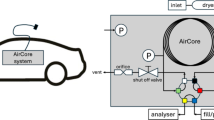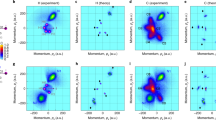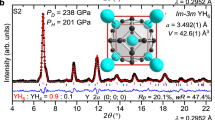Abstract
THE mechanism by which impurities influence the time for shock-treated argon to reach equilibrium ionization has been considered on numerous occasions1–4. No results have as yet been published, however, describing the effect of specific impurities. To remedy this situation, I am now making measurements of the total ionization times (see Fig. 1) in primary shocks through argon to which controlled amounts of various gaseous impurities have been added. The degree of ionization is monitored by following the time dependence of the intensity of the continuum emission at 4900 Å. Preliminary results show that hydrogen, at concentrations greater than 100 p.p.m., produces a very pronounced decrease in the total ionization time, and this communication suggests a novel explanation for this effect.
This is a preview of subscription content, access via your institution
Access options
Subscribe to this journal
Receive 51 print issues and online access
$199.00 per year
only $3.90 per issue
Buy this article
- Purchase on SpringerLink
- Instant access to full article PDF
Prices may be subject to local taxes which are calculated during checkout
Similar content being viewed by others
References
Petschek, H., and Byron, S., Ann. Phys., 1, 270 (1957).
Harwell, K. E., and Jahn, R. G., Phys. Fluids, 7, 214 (1964); 7, 1554 (1964).
Morgan, E. J., and Morrison, R. D., Phys. Fluids, 8, 1608 (1965).
Jones, N. R., and McChesney, M., Nature, 209, 1080 (1966).
Author information
Authors and Affiliations
Rights and permissions
About this article
Cite this article
COATES, P. Effect of Hydrogen-containing Impurities on Ionization Times in Shock-heated Argon. Nature 211, 300 (1966). https://doi.org/10.1038/211300a0
Issue date:
DOI: https://doi.org/10.1038/211300a0



